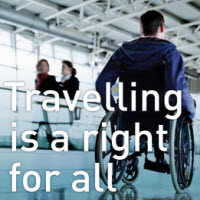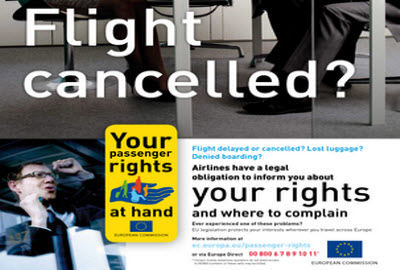The impact of Brexit on Access to Air Travel Rights
- Written by Roberto Castiglioni
 Ten days after the shock result of the EU Referendum, uncertainty on the impact of Brexit on the rights of disabled people traveling by air appears to be the only certainty.
Ten days after the shock result of the EU Referendum, uncertainty on the impact of Brexit on the rights of disabled people traveling by air appears to be the only certainty.
As if this wasn’t confusing enough, political turmoil all but adds chaos to uncertainty. The deeply divided governing party is busy electing its new leader and Prime Minister; meanwhile, the opposition, consumed by political infights, has effectively ceased to operate.
I tried to make some sense about the real impact of Brexit on Access to Air Travel based on indications from the platforms of candidates to the post of Conservative Party Leader and Prime Minister, narrowing down my forecast to three most scenarios.
Currently, the rights of disabled people traveling by air are protected by Regulation (EC) 1107/2006 which came into effect in the United Kingdom in July 2008. This law could be maintained, repealed, or rewritten if and when the UK effectively leaves the EU.
Brexit Lite
This is the scenario airlines, banks, and large businesses are heavily lobbying for. In other words, the UK exits the EU but remains in  the Single Market.
the Single Market.
Simply put, nothing changes as one of the conditions to access the Single Market is to accept that EU law supersedes national law.
However, there is a major obstacle that could prevent politicians from choosing this scenario. Under the Single Market rules, the UK would have to accept free movement of people, Leave campaign’s hardest fought principle.
Standard Brexit
In this scenario, the UK decides to abandon the idea of joining the Single Market, hence it does not have to comply with EU laws.
However, due the complexity of having to negotiate new trade agreements with multiple countries, the government could opt to save time and resources picking and choosing which existing EU laws to keep. Regulation (EC) 1107/2006 has all the numbers to be on the ‘keepers’ list.
All UK airports and all airlines already comply with the Regulation, not to mention it is in force in all 28 EU member states plus Norway, Iceland, Liechtenstein, and Switzerland. These four countries voluntarily comply with this law as part of the access to the Single Market agreements.
Hard Brexit
In this scenario, the UK repeals all EU laws and decides to rewrite them from scratch. But with resources primarily focused on drafting complex trade agreements, the government would either have to opt for a timed phasing out of existing laws, or rely on airports and airlines ‘good heart’ during the time elapsing between the Regulation ceasing to exist and the new law coming into force.
Smooth sailing in unchartered waters
Unless irrational (and frankly Un-British) political decisions prevail, I am reasonably confident there will be no change to the rights of disabled people traveling by air.
Whether in its current format or simply translated into UK law, the content and covenants of Regulation (EC) 1107/2006 will most likely remain in place.
This would be very good news for passengers and operators alike, a welcome element of certainty in these troubled times. Fingers crossed.










